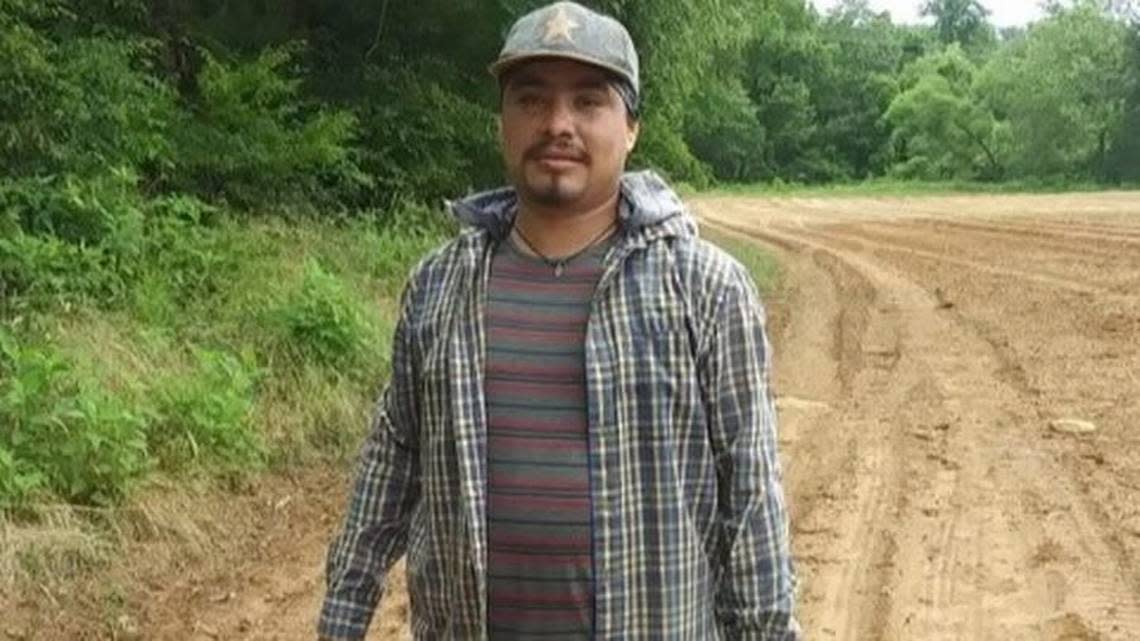A worker died on an NC farm on a very hot day. What happened before he passed out?

A 30-year-old migrant farmworker from Mexico died on a North Carolina sweet potato farm this month after fainting and becoming unconscious.
José Alberto Gonzalez Mendoza was working on a very hot day at Barnes Farming in Spring Hope the morning of Sept. 5.
Both the day’s high temperature of 94 degrees Fahrenheit and the average temperature that day were the highest recorded for a Sept. 5 since 2000, topping the averages by about 9 degrees and 6 degrees, respectively, according to the National Weather Service.
Gonzalez Mendoza had come to work on the farm with a seasonal H-2A visa less than 14 days before his death, according to Barnes Farming.
His death, first reported by WUNC, is being investigated as a possible cardiac arrest by the Nash County Sheriff’s Office. The state Office of the Chief Medical Examiner will conduct an autopsy, according to the Sheriff’s Office
“The entire Barnes Farming team is deeply saddened by the tragic passing of one of our coworkers. Our hearts and prayers go out to his wife, two children, and family,” Barnes Farming said in a statement to The News & Observer.
“Our company makes every effort to comply with all regulatory requirements and we follow well-established policies concerning workplace safety and environmental conditions,” the statement read.
Reported feeling ill
According to the company, Gonzalez Mendoza felt ill and went to rest on a bus near the field he was working in.
Farm personnel called 911 after checking on him and finding him unconscious, the company said. He died that day, though the company did not say whether he died on the farm or at a hospital.
“The Company empowers team members to take breaks when needed, and does not limit these breaks to specific times,” Barnes Farming said in response to questions from The N&O.
The farm “appropriately shortens shifts based on the weather” and provides water to its workers, the farm said through an attorney representing them.
Gonzalez Mendoza was from the state of Guanajuato in Mexico, according to Casa Azul de Wilson, a Latino community nonprofit that organized a GoFundMe fundraiser to help his family return his body to Mexico. It had raised over $10,500 as of Wednesday.
A worker’s death automatically triggers a weeks- or months-long investigation by the state’s Occupational Safety and Health Division.
The N.C. Department of Labor confirmed the state is investigating the death and has investigated Barnes Farming before. Those investigations were related to insufficient toilet and handwashing facilities in 2019 and a hazardous chemical issue in March 2020, for which the farm paid fines, according to spokeswoman Erin Wilson.
The N.C. Growers Association is one of the nation’s biggest users of the H2-A guestworker program, which allows primarily Mexican workers to come harvest North Carolina’s biggest crops, including tobacco and sweet potatoes.
An estimated 15,000 people work under the program each year in the state. While it helps migrant laborers support their families back home, the program has been criticized for workplace abuses, sub-standard worker housing, and generally harsh working conditions.
‘He just passed out’
Two 911 calls made before 11 a.m. Sept. 5 cited the heat as a possible factor in Gonzalez Mendoza’s death.
“I have a guy that ... he just passed out,” a man reported at 10:42 a.m. “We’re picking sweet potatoes, and it’s hot out here.”
A second caller minutes later reported a “sweet potato harvester with possible heatstroke.”
A Sheriff’s Office death investigation report requested by The N&O cited the incident under the code “CARDIAC OR RESPIRATORY ARREST-HOT” without additional details.
“Heat-related events are prevalent in the state when outdoor temperatures exceed 95 degrees with high relative humidity,” according to a Department of Labor heat stress investigation information sheet.
The heat index in the Spring Hope area was about 84 degrees around 10 a.m. when Gonzalez Mendoza complained about feeling ill, according to State Climate Office records.
Though it was much lower at that time than the 103 degrees later that day at 5 p.m., it had also been very hot the day before when the heat index exceeded 90 degrees from about noon to 8 p.m., topping out at 101.9 around 5 pm.
‘They’re out here in the heat’
The nonprofit Casa Azul de Wilson has been in touch with many H-2A farmworkers across eastern North Carolina, offering one-time financial assistance.
“They’re out here in the heat hustling, trying to put food on our table,” cofounder Elizabeth Herrera said in an interview. “A lot of (workers) have spoken out, and say ‘They don’t give us enough breaks.’”
Herrera was in touch with Gonzalez Mendoza’s brother, also a worker at the same company, who alleged that Gonzalez Mendoza was pushed to work despite feeling unwell and wasn’t allowed to rest until it was too late, WUNC reported.
The N&O and McClatchy reported in 2020 that North Carolina law lacks a heat standard that requires companies to give farmworkers and other employees rest and water breaks when temperatures reach certain levels.
Several states across the country including California and Washington have introduced some kind of heat standard.
About 36% of farmworkers in North Carolina have suffered symptoms of heat stress and 67% have reported working in extremely hot temperatures, a 2016 study from Wake Forest University found.

